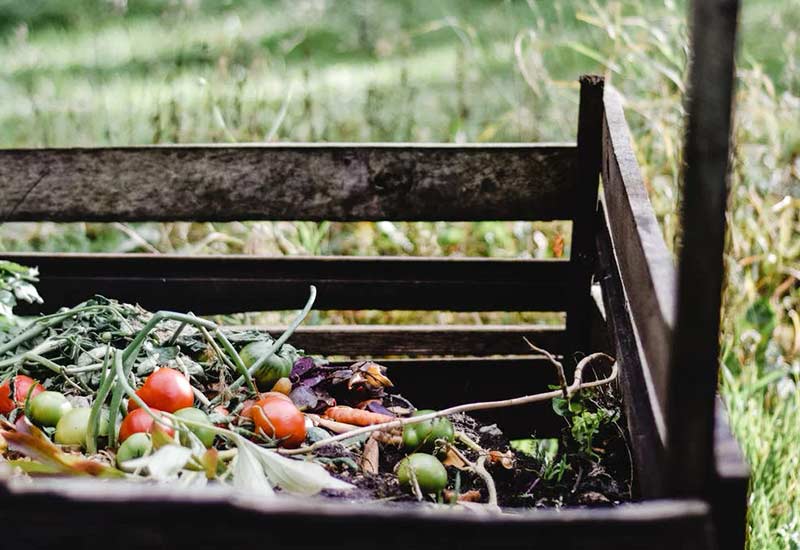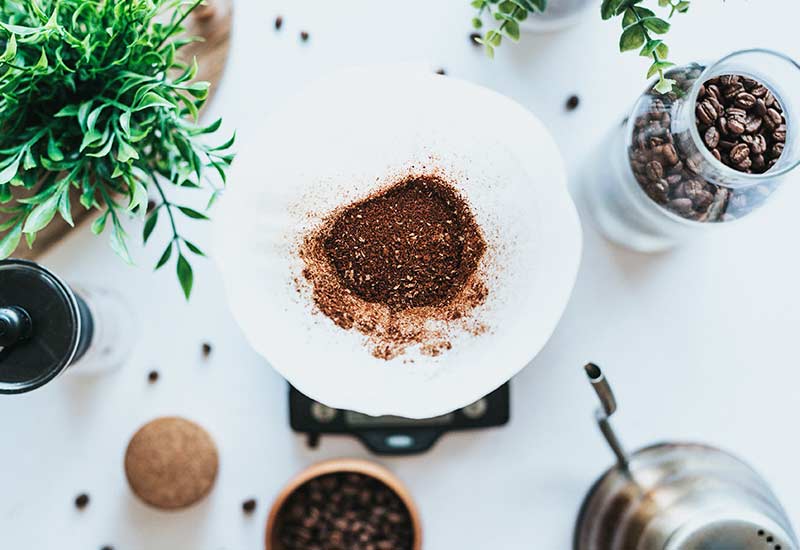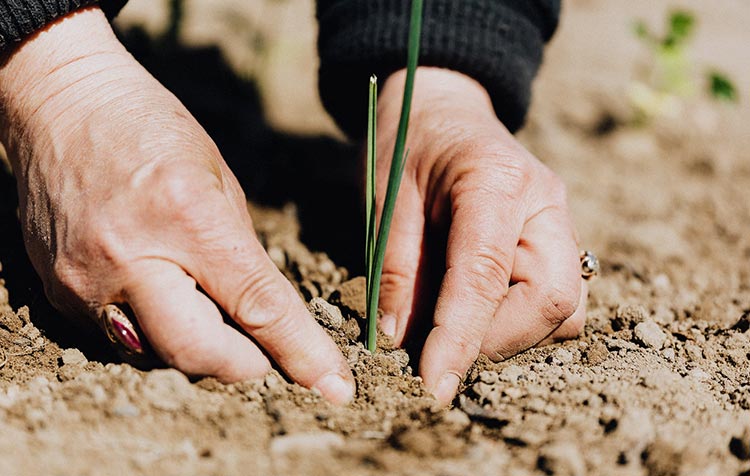Looking for a sustainable fertilizer? Then you've come to the right place! Whether in large-scale agriculture or in the small garden paradise: The use of fertilizers is important for soil fertility and the nutrient supply of plants. However, the correct dosage is crucial in order to use the fertilizer as effectively as possible and to avoid damaging the environment in the process. In addition, it is chemical fertilizers containing nitrogen and phosphorus that have a negative impact on water and air quality, but especially on soil fertility. Heavy metals are also present in some fertilizers and can enter both groundwater and the food chain.₁
Reason enough to think about natural alternatives and a more conscious use of our fertilizer. Here I present ten organic fertilizers for your plants. Let's go!
Here you can find a short overview in advance:
- Organic banana peels
- Wood ash
- Compost
- Manure
- Water algae
- Eggshells
- Clover mulch
- Nettle liquid manure
- Cooking water
- Coffee grounds
1. peels from organic bananas
Cut the peels of unsprayed organic bananas into small strips and let them dry in a warm place. However, they must not become moldy. Then you just mix them into the soil. This also works wonderfully with soil in planters and is therefore very advisable for fertilizing balcony and potted plants. Banana peels are basically also very suitable for fertilizing ornamental plants such as roses and geraniums - and last but not least vegetables such as cucumbers, tomatoes, potatoes and pumpkins.
Tip: How you Growing tomatoes yourselfI will explain this in a detailed separate article.
2. wood ash
Ash from a campfire or fireplace is an ideal fertilizer - provided you burn only 100 percent untreated natural wood. It contains a lot of potassium and supports especially well potatoes, tomatoes and tuberous vegetables such as celery. When planting seedlings, you can put a tablespoon of wood ash in each hole. Alternatively, simply spread a fine layer of ash over the bed.
3. compost

Making your own compost is a great and ecological alternative to chemical mineral fertilizers. A compost pile of vegetable waste, leaves and grass clippings takes about 9 months to decompose by earthworms, woodlice and microorganisms. What results is the best nutrient-rich humus. The plants then treat themselves to exactly the nutrients they need for healthy growth. The Composting by the way, works even on the balcony with a small composter (eg, a bokashi bucket or worm bin) and kitchen scraps.
Tip: For the decomposition are organic substrates with Effective Microorganisms useful. You can convert as little as 10 or 20 liters of kitchen waste into black soil with a natural fertilizing effect.
4. manure
Strawberries and horse manure - this combination has long been known as a sustainable fertilizer. Horse droppings and donkey excrement contain many important minerals such as phosphorus, magnesium, potassium and nitrogen. Their consistency also saves the soil from rapid drying. However, stable manure should not be placed fresh around plants. Ideally, you work the horse manure into the soil two months before planting seedlings.
Manure problem: The mixture of manure and animal excrement is available in abundance. Not least because many people consume animal foods such as meat and milk. However, with the excessive application of slurry, too many nutrients end up in the soil and also represent a major burden on groundwater. At "Manure - Sustainable Fertilizer or Dangerous Environmental Toxin?" I will explain the problem to you once again in detail.
5. water algae
Do you have a garden pond? If green algae grows in it, fish some of them out and let the water plants dry in a warm environment. Then you can grind them and mix them into the soil. Algae have a high content of nitrogen, potassium and phosphorus - and are therefore an ideal natural fertilizer.
6. eggshells
If you don't live vegan, egg shells will certainly accumulate sometimes during cooking and baking. You can use these directly for fertilization instead of throwing them in the organic waste garbage can. However, you should still peel off the skin inside. Then simply crush the shells and sprinkle over the respective bed. Eggshells provide a lot of lime and are also therefore particularly suitable for growing herbs such as thyme, lavender and sage.
7. clover mulch
Do you have access to fresh clover? Cut or mow it down. Then scatter it directly over your beds as a mulch layer. It will decompose on its own and release lots of nitrogen into the soil. What hasn't decomposed by fall, you can then work into the soil. A great and organic fertilizer for your plants!
8. nettle liquid manure
Nettles contain many healthy nutrients for plants and soil. You can put one kilogram of nettles in a container and fill it with ten liters of water. Then put a lid on it and let the mixture sit for about seven to fourteen days. Then sieve briefly and the useful stinging nettle liquid manure is ready.
Just dilute the slurry still with a little water. How to apply it? For the lawn in the ratio 1:50, for young plants 1:20 and for large shrubs 1:10. You can simply use it as a liquid fertilizer with the watering can. However, from experience you have to get used to the smell a little 😉.
9. cooking water
What do most people do with the water in which they have prepared asparagus, potatoes, broccoli or cauliflower? The answer: they pour it down the drain. In the process, the cooking process Extremely nutritious and is ideally suited for natural fertilization and irrigation of their own plants. But make sure that the water is only lukewarm at most and not too salty.
Insider tip pasta water: Even the cooking water of pasta dishes is rich in minerals and starch - and thus serves as a free and sustainable fertilizer for flowers and other plants at home. furthermore, it is also suitable, for example, for hair treatments and as a dishwashing liquid.
10. coffee grounds

Everyone knows about the residue of ground coffee beans left behind in the coffee filter. Fortunately, there are dozens Possible applications for the coffee grounds that are often disposed of too hastily. For example, it is a good natural fertilizer, but should only be used as a supplementary fertilizer.
First, carefully dry the coffee grounds. Then you can work it directly into the soil.
Attention! Please keep in mind that coffee grounds do not mold and consider their acidity. The latter aspect makes it suitable only as an organic fertilizer for plants that are naturally satisfied in a rather acidic environment - for example, azaleas and hydrangeas.
Which natural fertilizers should rather be avoided?
Organic fertilization is always preferable if you want to act sustainably and ecologically. Mineral fertilizers from the chemical plant should be avoided, as well as some natural fertilizers from the garden center. There, for example, like to Guano and horn shavings touted as a natural fertilizer.
Guano is excrement from bird colonies that breed on limestone rocks - these are mainly penguins and cormorants. It is an excellent natural fertilizer, but comes largely from Arctic regions. Environmentally friendly are the long transport routes in any case - and therefore one more reason to rely on your own compost as an organic fertilizer. Horn shavings are ground hooves and horns from slaughtered animals. As a source of animal nitrogen, they naturally fertilize the soil as well. But they do not provide other minerals and are produced only on the basis of animal suffering and cruelty to animals.
Organic, sustainable fertilizer for a secure future!
In fact, 50 kilograms of nitrogen per capita are released into the environment every year in Germany.₂ That can be improved! Through natural fertilization, we hobby gardeners can protect and promote plants, soil and groundwater quality, and ultimately our own health. Overfertilization and excessive nitrate levels in the soil will then be history.
Provided that you use the fertilizers sparingly and sensibly. Please make sure that you only use as much fertilizer as your plants need - and which fertilizer is appropriate for the growth of which plants. If you buy natural fertilizers from the trade, pay attention to the dosage recommendation, as well as to the respective origin.
Whether compost heap, algae, plant slurry or wood ash. I hope that I could introduce you to some sustainable fertilizers in this article that will help you. Do you have any questions, tips or your own experiences with organic fertilization that you would like to share here? Then I look forward to your comment!
Stay sustainable,

PS.: In fact, menstrual blood contains nitrogen, phosphate and potassium, three essential nutrients that plants need to grow. It's pretty unusual at first, but it's actually becoming more common as part of a sustainable period used as a natural fertilizer in the garden.
References:
₁ Federal Environment Agency: Fertilizers (as of 01.06.2022), available at https://www.umweltbundesamt.de/themen/boden-landwirtschaft/umweltbelastungen-der-landwirtschaft/duengemittel#schwermetalle-in-dungemitteln. [10.08.2022].
₂ Federal Environment Agency: Too much fertilizer is harmful (as of 17.03.2015), available at https://www.umweltbundesamt.de/themen/zu-viel-duenger-schadet. [10.08.2022].





